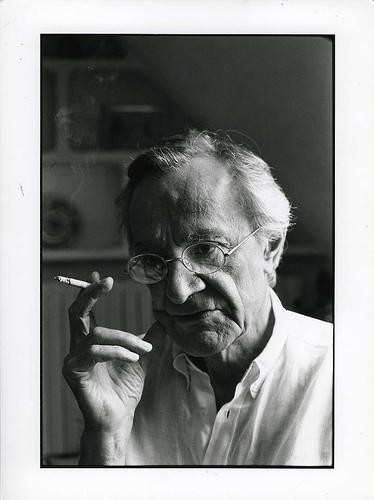Jean-Francois Lyotard
- 01.07.10, 13:32

Date of Birth: August 10, 1924 Date of Death: April 21, 1998 Nationality: French A self does not amount to much, but no self is an island; each exists in a fabric of relations that is now more complex and mobile than ever before. And today more than ever, knowing about that society involves first of all choosing what approach the inquiry will take, and that necessarily means choosing how society can answer. Even now it is no longer composed of the traditional political class, but of a composite layer of corporate leaders, high-level administrators, and the heads of the major professional, labor, political, and religious organisations. If we wish to discuss knowledge in the most highly developed contemporary society, we must answer the preliminary question of what methodological representation to apply to that society. Increasingly, the central question is becoming who will have access to the information these machines must have in storage to guarantee that the right decisions are made. Knowledge is and will be produced in order to be sold, it is and will be consumed in order to be valorised in a new production: in both cases, the goal is exchange.
Liberalism does not preclude an organisation of the flow of money in which some channels are used in decision making while others are only good for the payment of debts.
On the other hand, in a society whose communication component is becoming more prominent day by day, both as a reality and as an issue, it is clear that language assumes a new importance. One can decide that the principal role of knowledge is as an indispensable element in the functioning of society, and act in accordance with that decision, only if one has already decided that society is a giant machine. Our working hypothesis is that the status of knowledge is altered as societies enter what is known as the postindustrial age and cultures enter what is known as the postmodern age. Scientific knowledge is a kind of discourse. The ruling class is and will continue to be the class of decision makers. What guides Marxism, then, is a different model of society, and a different conception of the function of the knowledge that can be produced by society and acquired from it. What is new in all of this is that the old poles of attraction represented by nation-states, parties, professions, institutions, and historical traditions are losing their attraction.
What is required of a working hypothesis is a fine capacity for discrimination.
чтобы называться философом, да ещё и постмодернистом, недостаточно одеть очки, взяв сигарету "в зубы" и начать свою деятельность во второй половине XX века...
когда вся художественная литература Японии закончилась, мне в руки подвернулись писания адепта, не побоюсь этого слова, эпохи постмодернизма - Ж.-Ф. Лиотара (иногда Льотарда), конечно же, не без помощи моего преподавателя
многие считают, что стартом его, так сказать, "узнаваемости" стала книга "Состояние Постмодерна", но лично ко мне он пришёл со своим "Adorno as the Devil" и остался на долго в памяти
и ещё, лично ему я могу сказать ещё одно спасибо, как за любовь к французской литературе, так и за любовь лично к П. Зюскинду, который многим известен как автор знаменитого "Парфюмера"
(выше я привела несколько цитат на англ. языке, которые успешно обнаружила с помощью поисковой системы, на одном из самых релевантных сайтов)
P.S. эта заметка рассматривается скорее как записки на полях личного дневника, а не что-то стоящее внимания других

Коментарі